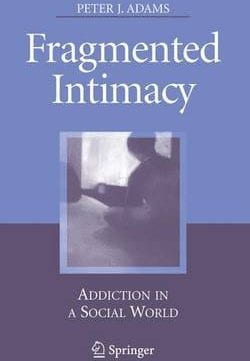Reviews & Endorsements
Fragmented Intimacy: Addiction in a Social World
New York: Springer, 2008
Peter Adams… takes the radical view that treating an addictive individual alone without mobilizing that person’s social environment is almost bound to fail… Adams explores the social dimension in long and loving detail, the theory softened throughout by the case histories of two couples and two pairs of parent/children… If you want an exciting read, this is it. The author is an enthusiast who has no illusions about the challenges of people, resources and money needed to set up and above all continue such a socially oriented scheme, which may take years to rescue the individual sufferer. Are the professionals prepared to take the initiative?”(Review in Alcohol and Alcoholism, 44(4):435) . See full review
Most work on addiction concentrates on individuals, primarily the addict but also family members or the family conceived as an individual entity. In this useful and informative book, Peter Adams introduces a different approach—one that concentrates on relationships. The book illustrates how by taking this approach we can more clearly see the ways in which an addict’s relationship with an addictive substance or process can affect the addict’s relationships with other people and aspects of their life. But this is not all, it also illustrates how the addict’s strengthening relationship to the addictive substance can affect the relationships of those close to him or her (for example, the relationships between family members of the addict)… As the book progresses the subject matter becomes more and more applied. Later chapters make use of the approach introduced earlier to illustrate some of the features of addictive relationships, and show how this approach can aid our understanding both of what is going on in such relationships and some of the problems with standard ways of dealing with addiction. These chapters are the most interesting in the book as they demonstrate the practical value of adopting a relationship centred approach. In doing this they help to show that this approach can pick up on aspects of addiction that are missed (or not fully understood) when using a more standard approach to addiction because they don’t fit into the individualistic paradigm that is being used to assess it from that perspective. Tom Walker (Keele University, UK, 2009), Addiction, 104(4), 677-678. See full review
Peter Adams… offers an insightful view of addiction problems with a social context. Discussing the initiation of treatment, Adams highlights the dangers of services that are normally focused on the individual with the addiction problem, adding further fragmentation into the social system. (From book, Social Behaviour and Network Therapy for Alcohol Problems, London: Routledge, p. 7)
The impression gained might be that this is a book for academics, not those working in treatment services and certainly of no value to clients. This is not the case, with the book devoting a significant proportion of space to the practical and applied aspects of a social theory. This is aided by four case studies tracked through each chapter and illustrating both the impacts of addiction and changes made. There are also numerous diagrams that assist understanding and these, along with chapter summaries and a logical development of ideas, ensure the reader remains well connected with the ideas the author is developing… Finally, I utilise this book clinically. This is definitely not a “self help book”, but I have shared some of the content with clients whose backgrounds allow them to access the material. They find the ideas relevant, and connect with both the central concept and the suggested areas of change. Most clients appreciate that they have developed a relationship with an addictive substance or process to the exclusion of intimacy: loneliness and “burnt bridges” are key features in their lives. Abstinence is a process of letting go an old friend, sometimes of grieving: there is fear and uncertainty about steps towards integration. Being able to talk at this level and plan that reintegration is a significant part of their change. (From review in Addiction Research Treatment News, in New Zealand)
Adams provides a refreshing, needed analysis that complements new scientific discoveries; he goes beyond biological and neuropsychological explanations to explore the reciprocal influences of social context and addiction … Adams’s coverage is novel, and the book is more comprehensive than previous works have been. He offers a solid theory and integrates empirical support throughout his discussion… this volume can serve as a library resource, a textbook, or a clinical manual. Summing Up: Highly recommended. All readers, all levels. (Review in CHOICE, Vol 45 (10) June).

